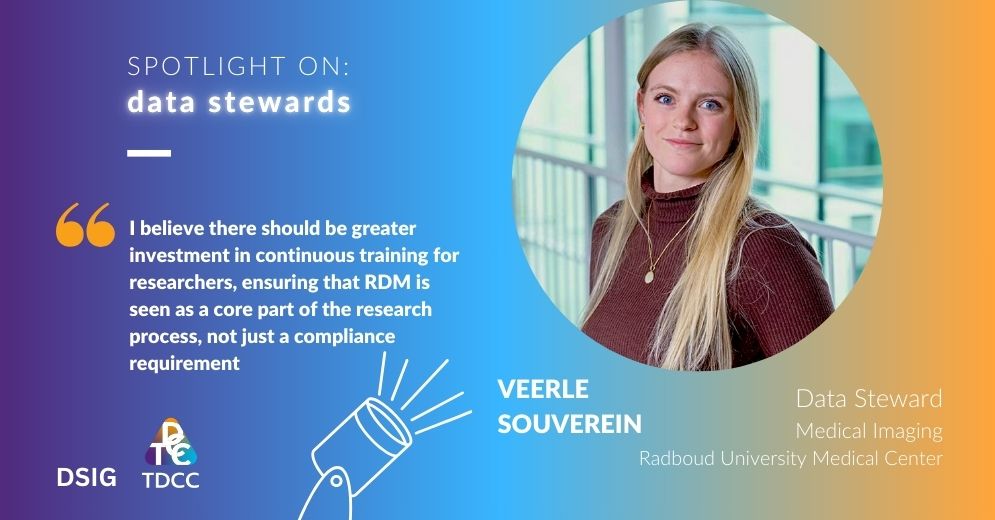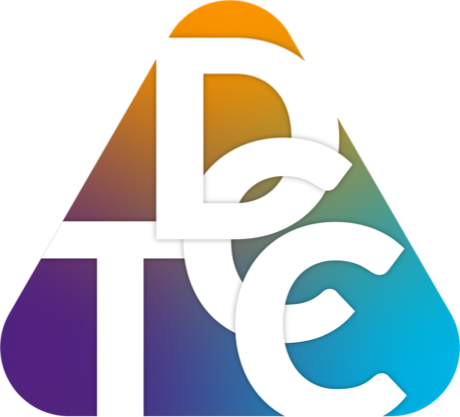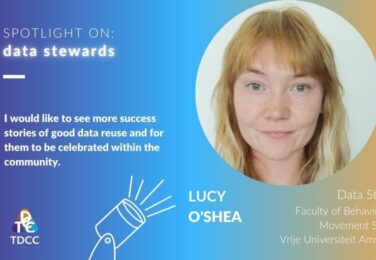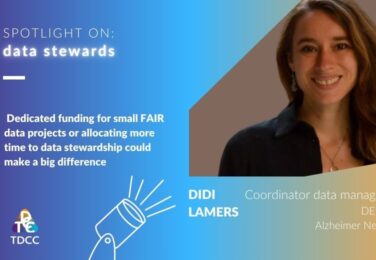
Spotlight on: Veerle Souverein
Every other week, the Thematic DCCs and the Data Steward Interest Group (DSIG) put the spotlight on one research data steward working in the Netherlands, to stimulate knowledge exchange and peer-to-peer learning.
What drew you towards the research data management field?
I have always had a deep appreciation for research and its ability to uncover new knowledge and solve complex problems. However, I realized early on that I wasn’t particularly eager to conduct the research myself. Instead, I found myself drawn to roles where I could contribute to research from a different angle—by enabling and supporting others in their work.
This led me to explore career paths that combined my passion for research with my strengths in organization and problem-solving. During this search, I came across a vacancy for a data steward, a role I hadn’t heard of before. Intrigued, I delved into what it entailed and discovered that it perfectly aligned with my interests: providing essential support to researchers while playing a key role in managing and safeguarding research data. It felt like the ideal way to stay connected to the world of research while leveraging my skills to make a meaningful impact behind the scenes.
What is an activity/task of your role that you find yourself looking forward to?
One activity I always look forward to is collaborating directly with researchers to help them navigate complex data management challenges. Whether it’s guiding them through creating a robust data management plan, finding the best solutions for secure data storage, or ensuring compliance with regulations, I enjoy being part of the process that makes their research more streamlined and impactful.
I find it particularly rewarding when I can simplify something that initially seemed overwhelming for them. Those moments when I see their confidence grow because they feel supported and better equipped to handle their data—it reminds me why I love what I do. It’s not just about solving problems; it’s about empowering others to focus on what they do best: their research.
What is something unexpected that you can offer help with if a colleague reaches out to you?
Something unexpected I can offer help with is organizing and visualizing complex problems and solutions. I have a knack for breaking down challenges into manageable steps and presenting them in a clear, visual way that makes it easier for colleagues to understand and address the issue.
Whether it’s mapping out workflows, creating infographics to explain processes, or brainstorming creative approaches to streamline research activities, I enjoy combining my organizational skills with a creative touch. This ability often surprises colleagues, as it helps bring clarity and structure to situations that might initially feel overwhelming or unclear.
What do you think your community of research data professionals is missing?
I think one of the key things missing is greater availability and visibility of data stewards among researchers. Many researchers either don’t know that we exist or are unsure of how we can support them in their projects. This often leads to missed opportunities for collaboration and proactive guidance, especially early in the research lifecycle when proper data management can make the biggest difference.
Improving our presence and integrating data stewards more seamlessly into research teams could help bridge this gap. By making our role more visible and accessible, we can better demonstrate our value and ensure researchers see us as essential partners in their work.
What is a topic you would want to collaborate on with others?
One topic I would really like to collaborate on with others is the ethical aspects surrounding the use of medical data for research. I feel that there is often too little discussion about the ethical considerations in this area, especially when it comes to balancing research needs and legal requirements.
While there is a strong focus on the technical and logistical aspects of data management, the ethical side often gets overshadowed. Issues like patient consent, privacy, and the potential for misuse of sensitive data are critical, yet they are not always addressed as thoroughly as the legal and procedural elements. I believe it's essential to foster more dialogue within the research data community about how we can ensure that medical data is used ethically, while still meeting the needs of researchers.
How would you like to see your current field of work evolve in the next 5 years?
In the next 5 years, I hope to see research data management (RDM) become more standardized across the Netherlands, with clearer guidelines and fewer grey areas. A unified approach would help researchers navigate data management with greater ease and consistency.
I also envision more collaboration between institutions and data professionals, allowing best practices to be shared and implemented more widely. Additionally, I hope that FAIR principles will become an integral part of research workflows, rather than something separate.
Lastly, I believe there should be greater investment in continuous training for researchers, ensuring that RDM is seen as a core part of the research process, not just a compliance requirement.
Get in touch with Veerle via LinkedIn or email.
Do you want to read other interviews published in the Spotlight on series? Visit the series' page.
Are you a data steward or data professional who wants to be featured in one of the future editions? Fill out this form.



